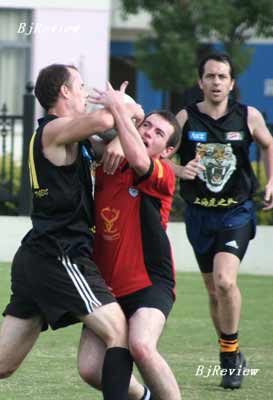It's the hour of the evening to keep working on that report, clear the email inbox or set up social appointments for the weekend. You could also ease into the evening with a nice dinner date in one of the city's innumerable fine restaurants.
The easier option is always excusable when Beijing's corporate world is a high tempo race against competition and deadlines. Jennifer Pratt faces the dilemma every Tuesday evening, in the hour before the training session of the Beijing Gaelic Football Club. Usually the 30-year-old leaves her desk. "You lace up your football boots and spend two hours pushing the body to limits you didn't know existed. You feel great."
An old sport mostly confined to Ireland, a small island nation on the western edge of Europe, Gaelic football is bringing together 20 nationalities into a close-knit club in the capital of China. Most of the men and women who meet for the two-hour training sessions are busy professionals often running the Chinese operations of multinational companies.
Unfortunately many run themselves into the ground, fighting for market share in a promising but fiercely competitive marketplace. Taking time out for football is worth it for those who do pull on their playing gear. A 40-minute-to-one-hour warm-up session which alternates between jogging and sprinting "clears out the cobwebs in your mind," says club trainer Colin Dixon, who came to Beijing to take up a role at an investment consultancy.
The next part is trickier: learning the skills of the game. Though some club players are Irish, most of the 20 other nationalities are first-timers to the game. Sometimes described as a mix of rugby and soccer, the game pits teams of 15 in games of two 30-minute periods. The sport began in 18th century Ireland and eventually evolved into the country's most popular game, but the speed and physicality of the game demand a complex system of rules.
Players compete jumping in the air to catch the football, or race to pick the ball off the ground. "Foot under the ball, foot under the ball!" shouts a trainer. Words of encouragement in the solo, the art of moving the ball from toe-top to hand while racing into attack.
It often takes months for players to pick up the skills, but club members tend to be persistent, and loyal, says Dixon, who tacks several hours onto a busy schedule each week to devise training programs. "People are hungry for a team sport and for fitness and a community they can plug into," he says.
The club's development has not been without its glitches. Finding the right field in the right location has been a compromise. After alternating between the city's Worker's Stadium and a soccer grounds for mid-week practice, the players now rent the astro-turfed playground of a primary school a few doors down from the North Korean Embassy near Ritan Park. On Sundays the teams train in the grounds of an international school in residential Shunyi in the city suburbs.
Recruiting Chinese players has been a club priority. Beijing Gaelic Football Club has more players than it needs but wants more locals in its ranks. Chinese women don't come so easily to Gaelic football, says Wu Meng, one of the club's Chinese players. "Chinese girls are supposed to take up more elegant sports like dancing, swimming or yoga rather than running for a ball on the pitch."
Yet the game is catching on locally. Goalkeeper on the men's team, Gerard Whitty, talks of being approached by an enthusiastic fellow passenger while queuing to check in for an early-morning flight from Beijing for a conference in Shanghai. "I was carrying my club bag and he read the name in Chinese. He'd seen a clip about us on Chinese TV and wanted to join. I spent the whole flight to Shanghai explaining the rules of the game to him."
Over 15 nationalities were represented on the teams taking part that traveled to a steamy Singapore Polo Grounds in June for the 12th annual Asian Gaelic Games in June. Almost 500 players from 48 teams traveled from 10 states to the Games, which were opened on June 22 by former Irish Vice Premier Dick Spring.
Three teams traveled from the Chinese mainland, Beijing, Shanghai and Shenzhen, each bringing an A and a B team to play games, which because of Singapore's heat, were shorter than the traditional 30 minute games. After two days of games in the swelteringly humid Singapore temperatures, teams traveling from Hong Kong and Dubai retained their men's and women's titles with victories over Singapore and South Korea, respectively.
Proofing that busy executives everywhere need time out, teams for the first time represented Malaysia, Thailand and Viet Nam. "The tournament is one of the largest annual amateur sporting events in Asia," says Pratt.
True to the spirit of corporate efficiency, players double task socializing with fundraising. A recent 150-yuan per-person pub-crawl allowed club members and friends cheap drinks at six Beijing bars and raised the funds to buy new club equipment.
Fitting, given they play ball in a socialist country, club members collected a whopping 50, 000 yuan on an end-of-season party. The cash, donated to an orphanage in suburban Beijing, was the club's chip-in to China's official quest for a harmonious society, says Pratt. A good score all-around, then.
By MARK GODFREY
The author is Irish and lives in Beijing
(Beijing Review August 16, 2007)


